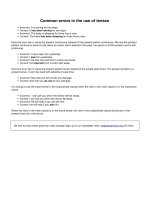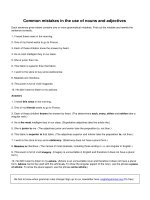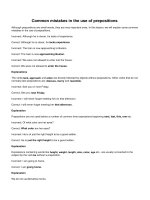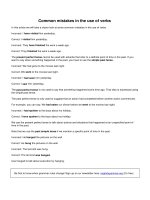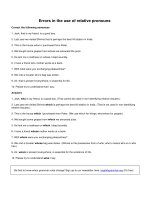Mistakes in the use of adjectives
Bạn đang xem bản rút gọn của tài liệu. Xem và tải ngay bản đầy đủ của tài liệu tại đây (15.84 KB, 2 trang )
Mistakes in the use of adjectives
Here is a list of errors that ESL students often make in the use of adjectives.
Incorrect: She is more stronger than her sister.
Correct: She is stronger than her sister.
Avoid double comparatives. Adjectives of one syllable usually form their comparatives by adding
–er
to the
positive. Longer adjectives take
more
.
Incorrect: Bombay is
further
from Delhi than Agra.
Correct: Bombay is
farther
from Delhi than Agra.
Further
means ‘additional’.
Farther
is used to talk about distance.
Incorrect: You have much books.
Correct: You have many books.
Incorrect: I have many work to do.
Correct: I have much work to do.
Use
much
with uncountable nouns. Use
many
with countable nouns.
Incorrect: She is growing strong and strong everyday.
Correct: She is growing stronger and stronger everyday.
The comparative form of the adjective is used in structures like these.
Incorrect: Let’s go quiet somewhere.
Correct: Let’s go somewhere quiet.
The adjective usually goes after expressions like
somewhere
.
Incorrect: I can’t afford that a big car.
Correct: I can’t afford that big a car.
Note the pattern:
that + adjective + a/an + noun
Incorrect: Tell me the last news.
Correct: Tell me the latest news.
Latest
means ‘the most recent’.
Last
means ‘the previous one’.
Incorrect: I have less worries than you.
Correct: I have fewer worries than you.
Use
less
with uncountable nouns. Use
fewer
with countable nouns.
Incorrect: He wasted his all wealth.
Correct: He wasted all his wealth.
Quantifiers like
all, both
and
half
go before possessives.
Be first to know when grammar rules change! Sign up to our newsletter here: englishgrammar.org (It's free)
Powered by TCPDF (www.tcpdf.org)
